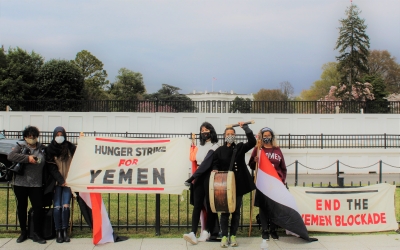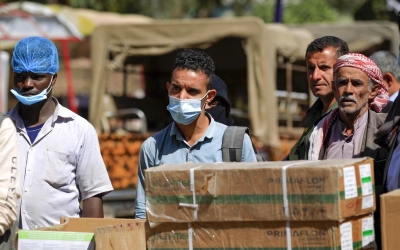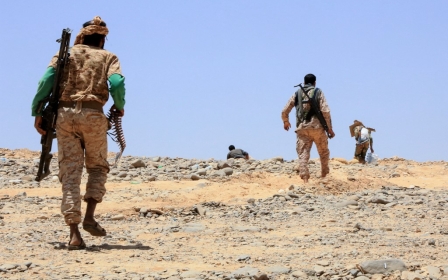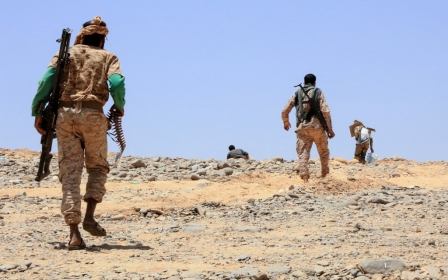Is US still involved in Yemen war? Biden's envoy says he doesn't know
The Biden administration's envoy for Yemen says he does not know the nature of the US military's involvement in a conflict he's trying to solve.
Quizzed on the subject by Congress members at a hearing on Wednesday, Tim Lenderking said he was unaware of how President Joe Biden's pledge to end US support for Saudi offensive operations in Yemen had been enacted.
"I'm not totally in that information loop, congressman, so I can't really speak to that," Lenderking said in response to a question by Democratic Representative Ted Lieu.
"I do think that we need to make sure that Saudi Arabia is able to defend itself... but my focus is driving toward a ceasefire, so we can get out of this whole question of offensive and defensive weapons."
Pressed on the same issue by Congressman Tom Malinowski, Lenderking reiterated that he was not privy to how the US military was assisting the Saudi-led coalition.
New MEE newsletter: Jerusalem Dispatch
Sign up to get the latest insights and analysis on Israel-Palestine, alongside Turkey Unpacked and other MEE newsletters
"I know there's a robust relationship - as there has been over decades - between the US and Saudi Arabia on security matters, but I would have to defer to the DoD (Department of Defense) for the details of the kind of issues that I think you're raising."
Envoy calls Iran 'terrorist'
US lawmakers who have been pushing for an end to Washington's military participation in the conflict wrote a letter to Biden earlier this year, seeking clarifications on what his proclamation of ending support for offensive operations meant exactly.
But since announcing the policy in February, the administration has not provided details about the changes in US involvement in the war.
On Wednesday, Lenderking described Saudi Arabia and the United Arab Emirates as "partners", while referring to Iran as a "terrorist" regime that was arming the Houthi rebels and fuelling the war, reflecting Washington's traditional geopolitical posture in the region.
"If the Houthis want to continue a relationship with a terrorist state like Iran, then that's going to bode extremely poorly for prospects for peace and security in Yemen," he said.
As a candidate, Biden condemned Saudi Arabia and called it a "pariah", joining much of his Democratic Party in calling for rethinking Washington's ties with the kingdom.
But since taking office in January, he has refused to impose sanctions on Crown Prince Mohammed bin Salman following the release of a US intelligence report that described the Saudi royal's alleged involvement in the murder of US-based journalist Jamal Khashoggi.
The US administration is also moving ahead with the sale of F-35 advanced fighter jets to the UAE, Saudi Arabia's chief ally in the coalition against the Houthis, after an initial pause.
The UAE says it has withdrawn its troops from Yemen, but anti-war activists say Abu Dhabi remains involved in the conflict.
The Saudi-led coalition began its bombing campaign against the Houthis in March 2015 after the rebels took over Sanaa and toppled the Riyadh-backed government of President Abd Rabbuh Mansour Hadi.
The United Nations calls Yemen the world's worst humanitarian crisis, and the war has killed more than 230,000 people, causing outbreaks of disease and pushing the impoverished country to the brink of famine.
Saudi Arabia views the Houthis as proxies for Iran, but the rebels claim to represent the Yemeni people against what they call the corruption and aggression backed by the kingdom.
Last month, Saudi Arabia proposed a nationwide ceasefire amid a Houthi push to capture the strategic city of Marib, against the warnings of Western powers.
The Houthi rebels dismissed the initiative, calling for the unconditional lifting of the Saudi-led air and sea blockade on the country.
Ending the blockade
On Wednesday, Lenderking - who previously played down the effects of the blockade - said Washington was working with Riyadh to ensure the flow of goods and humanitarian assistance to Yemen.
"Borders and ports and airports - all of these vital economic arteries should be open, and access should be unimpeded, and this is a core principle of our engagement," Lenderking told lawmakers.
Humanitarian aid and fuel arrive to Yemen only through the ports of Hodeidah and Saleef, after being inspected by the United Nations to make sure ships are not carrying weapons to the Houthis.
But even after being cleared by the UN Verification and Inspection Mechanism (UNVIM), ships frequently get held up by the Saudi-led coalition and its Yemeni allies.
UNVIM data shows that no fuel was allowed into the country in February, and only 38,309 tonnes were distributed in March, down from 164,660 tonnes last November - before Saudi Arabia started intensifying the siege.
While Lenderking insists that food is arriving in Yemen through the UNVIM, the World Food Programme has warned that fuel shortages are intensifying food insecurity in the war-torn country.
"These acute fuel shortages threaten the availability of clean water and electricity supply. Health facilities that rely on fuel for generators are without power," WFP said in a statement early in March.
"Higher fuel prices also mean higher food prices at a time when over 16 million food insecure Yemenis are already struggling to afford basic foods, all coming together and culminating in another shock that will further heighten the fragility of those most vulnerable."
US Congress members have been calling on the Biden administration to help end the blockade.
"We write to express our concern about restrictions imposed by the Saudi-led coalition on commercial and humanitarian imports into Yemen and ask that you urgently push for them to be lifted," a dozen lawmakers wrote in a letter to the US administration earlier this month.
Yemeni-American activists also staged a hunger strike in Washington in early April to demand an end to the blockade.
On Wednesday, Lenderking said he was engaged in daily talks with Saudi officials to ease the restrictions on fuel imports, but he refused to outline any possible consequences for the kingdom if it refused to cooperate.
"I cannot articulate what those consequences would be... I would also just point out that food has continued to move through Hodeidah port, so there hasn't been a blockade on food and other essential commodities," Lenderking said.
Middle East Eye delivers independent and unrivalled coverage and analysis of the Middle East, North Africa and beyond. To learn more about republishing this content and the associated fees, please fill out this form. More about MEE can be found here.






